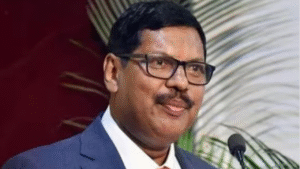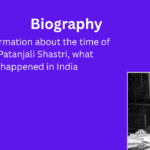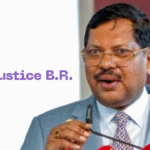The Indian court has produced a number of outstanding thinkers who have influenced the country’s legal future. Chief Justice B.R. Gavai is one of them; his name is a byword for honesty, hard work, and a steadfast dedication to justice. His ascent from a tiny Maharashtra hamlet to India’s highest court is both motivational and firmly anchored in the values of equality and the Constitution that he defends.
Early Life and Academic Foundation Chief Justice B.R. Gavai
The tale of B.R. Gavai, who was born in Amravati, Maharashtra, on November 24, 1960, is that of a self-made man who, via hard work, ascended through the Indian legal system. He had a strong interest in the legal field from a young age because he was raised in a household that emphasized hard work and education. His early years were characterized by a keen interest in governance and justice, two concepts that would come to define his remarkable career.
Learn more: PTC Punjabi News
The Beginning of a Legal Journey
His career in the legal profession began on March 16, 1985, when he entered the Bar. Early on, he collaborated with the late Barrister Raja S. Bhonsale, who had been the Advocate General before becoming a High Court judge. Between 1985 and 1987, Chief Justice B.R. Gavai had the opportunity to work under such a renowned legal scholar, which helped him to comprehend the intricate web of administrative and constitutional law.
Following skill development, he started working independently at the Bombay High Court from 1987 to 1990 before relocating mostly to the Nagpur Bench. It was at this point that his standing as a knowledgeable and moral attorney started to quickly expand.

Practicing Law Across Multiple Sectors
The career of Chief Justice B.R. Gavai demonstrates adaptability. His main areas of expertise were administrative law and constitutional law, which are the cornerstones of the Indian legal system. He has represented a number of governmental organizations and public institutions over the years, such as Amravati University, the Municipal Corporation of Nagpur, and Amravati Municipal Corporation.
In addition, he made appearances before a number of municipal councils in the Vidarbha area as well as independent organizations and enterprises including SICOM and DCVL. Because of this broad exposure, he was better able to comprehend public administration and governance from a legal standpoint, which improved his ability to interpret the Constitution in a way that strikes a balance between the rights of citizens and the authority of the state.
Public Service and Legal Leadership
Chief Justice B.R. Gavai was Assistant Government Pleader and Additional Public Prosecutor at the Bombay High Court’s Nagpur Bench from August 1992 until July 1993. He gained a reputation as a fair-minded attorney due to his acute sense of justice and aptitude for deciphering intricate legal issues.
On January 17, 2000, he was named Government Pleader and Public Prosecutor for the Nagpur Bench in appreciation of his experience. He had to represent the State of Maharashtra in significant cases pertaining to governance, policy, and constitutional interpretation as part of this duty. The judiciary quickly took notice of his impartial stance and dedication to justice..
Elevation to the Judiciary
B.R. Gavai was promoted to Additional Judge of the Bombay High Court on November 14, 2003, and he was made a Permanent Judge on November 12, 2005, a mere two years later. He presided over cases in Mumbai, Nagpur, Aurangabad, and Panaji over the course of the following ten and a half years, managing a wide variety of legal matters.
His rulings demonstrated a great respect for constitutional morals, empathy for the poor, and a thorough comprehension of the law. He approached every case with an analytical mind and a compassionate heart, whether it involved civil and criminal law or environmental and educational issues.
Journey to the Supreme Court of India
A significant milestone was reached in May 2019 when Justice B.R. Gavai was promoted to the Supreme Court of India. His appointment was warmly applauded because it symbolized not only his particular accomplishment but also the Indian judiciary’s inclusivity, which allows talent from all backgrounds to advance solely on the basis of merit.
Chief Justice B.R. Gavai covered a wide range of topics while serving on the Supreme Court, including criminal law, constitutional law, business conflicts, arbitration, the law of the environment, and educational issues. He served on around 700 benches during his time there. His courtroom was renowned for its fair hearings, lucid logic, and orderly behavior.
Contributions to Indian Jurisprudence
As a jurist, Chief Justice B.R. Gavai has authored nearly 300 judgments, many of which have had far-reaching implications for governance and civil rights. His role in Constitution Bench judgments reaffirmed the principles of democracy, separation of powers, and the rule of law.
His decisions consistently reflected his belief that the Constitution is a living document meant to protect citizens from arbitrary power while ensuring social justice and equality. Whether it was interpreting the rights of marginalized communities or defending environmental safeguards, Chief Justice B.R. Gavai reasoning often emphasized human dignity and constitutional morality.
Elevation as the Chief Justice of India
One of the few judges from Maharashtra to hold this prestigious position is Justice B.R. Gavai, who was appointed Chief Justice of India on May 14, 2025. His appointment was seen as an acknowledgement of his longstanding commitment to preserving justice, fairness, and the fundamental principles of the legal system.
His goals as Chief Justice center on improving access to justice through digitization, decreasing case pendency, and bolstering the transparency of court procedures. Additionally, he supports judicial changes that guarantee prompt justice delivery without sacrificing integrity and quality.
Global Recognition and Academic Engagements
Outside of the courtroom, Chief Justice B.R. Gavai has represented India at a number of international conferences, such as those in Nairobi, Kenya; Ulaanbaatar, Mongolia; New York, USA; and Cardiff, UK. His involvement in these gatherings is indicative of India’s increasing influence on international legal debate.
Additionally, he has given lectures on constitutional governance, environmental justice, and judicial independence at esteemed universities like Harvard University and Columbia University. These appearances demonstrate his position as an academic spokesperson for democratic principles and sustainable development in addition to his role as a jurist.
Philosophy and Judicial Vision
According to Chief Justice B.R. Gavai, the Indian Constitution serves as a moral compass that steers the country toward equality and fraternity rather than just being a legal text. His rulings frequently emphasize how important it is for the judiciary to maintain its independence while still being sensitive to the needs of regular people.
He is renowned for advocating for inclusivity and diversity in the judiciary, contending that having representatives from a range of socioeconomic and geographic backgrounds enhances public confidence in the organization. His leadership style is characterized by humility, teamwork, and an unwavering belief in the values established by the Constitution’s framers.
Legacy and Inspiration
The ascent of Chief Justice B.R. Gavai represents the opportunities that the Indian democratic system provides to all citizens, irrespective of their background. His life is a shining example of tenacity and moral character, from his humble beginnings in Amravati to the halls of the Supreme Court.
His goal remains unwavering as he continues to serve as head of the judiciary: to protect the rule of law, maintain the independence of the courts, and guarantee justice for all citizens—values that are fundamental to the Indian republic.
Conclusion
Chief Justice B.R. Gavai stands out as a figure of reform and reassurance in an era when the judiciary is confronted with the twin challenges of growing caseloads but public expectations. In addition to being a tale of professional achievement his life serves as evidence of the resilience of India’s democratic and constitutional system. Generations of attorneys, judges, and people have been inspired by him because of his vision, leadership, and steadfast sense of justice.






